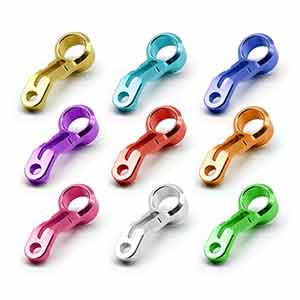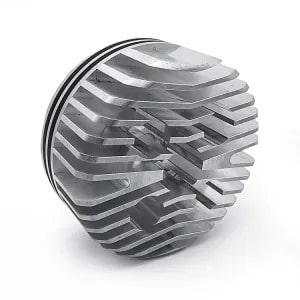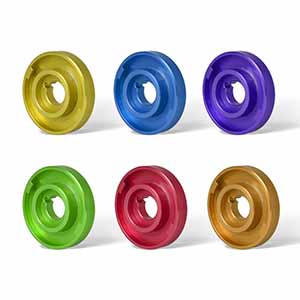Aluminum Parts
Aluminum CNC Machining Services
CNC machining aluminum parts is one of our main business fields. We provide aluminum cnc service at low cost, fast delivery, and high precision. No minimum quantity and CNC prototyping service is accepted.
- No MOQ is required
- Best quality you can expect
- Fast delivery at 3 days start
- 7*24H Design & technique support

Process: CNC turning
CNC milling
Materials:6061-T6, 7075-T6, 7050, 2024, 5052, 6063
Lead time:
As fast as 3 days for rapid prototype sample






Aluminum Alloys for CNC Machining
Aluminum is a commonly used material in the manufacturing industry due to its excellent properties such as low density, high strength-to-weight ratio, corrosion resistance, and good machinability. When it comes to CNC machining aluminum alloys, some popular choices include:
6061-T6: This is one of the most widely used aluminum alloys for machining applications. It offers good strength, excellent corrosion resistance, and high weldability. It is commonly used in aerospace, automotive, and general machining applications.
7075-T6: This alloy is known for its high strength and hardness. It is commonly used in applications that require high structural strength, such as aircraft and aerospace components, bike frames, and high-performance automotive parts.
2024-T3: This alloy is well-known for its excellent machinability and good strength-to-weight ratio. It is commonly used in the aerospace industry for manufacturing aircraft structures, engine components, and fuselage skins.
5052-H32: This alloy is non-heat treatable and offers good formability, corrosion resistance, and weldability. It is commonly used in sheet metal fabrication, automotive parts, and general machining applications.
5083-H116: This alloy is often used in marine applications due to its excellent corrosion resistance and high strength. It is also commonly used in the manufacturing of pressure vessels, structural components, and transportation equipment.
6063-T5: This alloy is known for its good formability and excellent extrudability, making it commonly used in the production of aluminum extrusions such as window frames, door frames, and architectural shapes.
These are just a few examples of aluminum alloys that are commonly used in machining applications. The choice of alloy depends on the specific requirements of the application, considering factors such as strength, corrosion resistance, machinability, and cost.
Advantages of Aluminum Alloys
Better Finish: Aluminum has a relatively soft and ductile nature, which allows for excellent machinability. This means that it can be easily cut or shaped with accuracy, resulting in a superior finish.
Lightweight: Aluminum is a lightweight metal, making it an ideal choice for applications where weight reduction is essential. Machining aluminum components can help to reduce the overall weight of a product or structure without sacrificing strength.
High Strength-to-Weight Ratio: Despite its lightweight nature, aluminum has a high strength-to-weight ratio, meaning it offers significant strength while being relatively light. This makes it suitable for applications where both strength and weight are important factors.
Corrosion Resistance: Aluminum has a natural resistance to corrosion, as it forms a protective oxide layer on its surface when exposed to air. This makes it well-suited for applications where it may come into contact with moisture or other corrosive environments.
Excellent Thermal and Electrical Conductivity: Aluminum is an excellent conductor of heat and electricity. This property makes it useful in applications such as heat sinks, electrical enclosures, and components for electronic devices that require efficient heat dissipation or good electrical conductivity.
High Machinability: Aluminum is known for its ease of machining. It can be milled, bored, drilled, turned, and tapped with relative ease, resulting in reduced machining times and costs.
Recyclability: Aluminum is a highly recyclable material, allowing for cost-effective and environmentally friendly production processes. Machining aluminum components can contribute to the overall sustainability and circularity of the manufacturing industry.
CNC Machining Aluminum Parts Applications
Machined aluminum is used in a wide range of applications due to its high strength-to-weight ratio, excellent corrosion resistance, and versatility. Here are some common applications:
Aerospace Industry: Machined aluminum is extensively used in the aerospace industry for components like aircraft frames, wings, engine parts, and interior fittings. Its lightweight nature helps reduce fuel consumption and increase payload capacity.
Automotive Industry: Machined aluminum is used in the automotive industry for various components like engine blocks, cylinder heads, transmission parts, wheels, and suspension systems. Its lightweight and durable properties help improve fuel efficiency and overall vehicle performance.
Electronics Industry: Machined aluminum is used in the production of electronic enclosures, heat sinks, connectors, and chassis due to its excellent thermal conductivity and electrical properties. It helps dissipate heat and protect sensitive electronic components.
Medical Industry: Machined aluminum is used in the medical industry for applications such as surgical instruments, imaging equipment, prosthetics, and medical device components. Its biocompatibility and corrosion resistance make it suitable for medical use.
Architectural Industry: Machined aluminum is used in the architectural industry for applications such as doors, windows, facades, railings, and decorative elements. Its lightweight and modern aesthetic appeal make it a popular choice for both interior and exterior architectural projects.
Industrial Machinery: Machined aluminum is used in the manufacture of various industrial machinery and equipment, including pumps, valves, motors, gears, and bearing housings. Its strength and durability allow it to withstand challenging operating conditions.
Consumer Products: Machined aluminum is employed in the production of consumer products such as smartphones, laptops, cameras, kitchen appliances, and sporting goods. Its lightweight, sleek appearance, and resistance to wear and tear make it suitable for everyday use.
Marine Industry: Machined aluminum is used in the marine industry for applications like boat hulls, decks, masts, and rigging. Its corrosion resistance and lightweight properties make it ideal for marine environments.
Defense Industry: Machined aluminum is utilized in the defense industry for manufacturing military equipment such as weapons, vehicles, body armor, and aircraft components. Its strength and durability are crucial for defense applications.
Renewable Energy: Machined aluminum is used in the renewable energy industry for applications like wind turbine components, solar panel frames, and hydroelectric power systems. Its lightweight nature and resistance to environmental factors make it suitable for energy generation.
These are just a few examples, but machined aluminum finds applications in many other industries like construction, transportation, sports, and more due to its unique properties and versatility.
